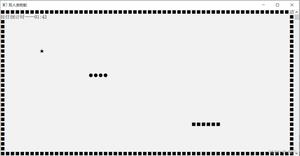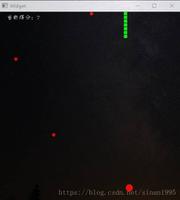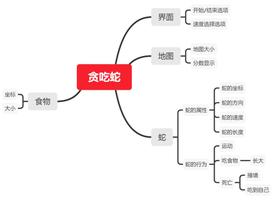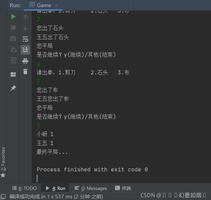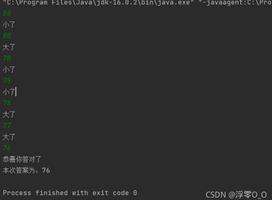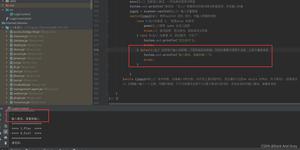C++代码实现贪吃蛇小游戏
本文实例为大家分享了C++实现贪吃蛇小游戏的具体代码,供大家参考,具体内容如下
1.游戏描述
贪吃蛇可谓是从小玩到大的经典趣味小游戏,蛇每吃到一次食物,身体就会长一节,如果撞到墙或者撞到自身,游戏结束。
2.代码实现
1.首先需要思考的问题是如何指定位置输出字符?这时候就有一个非常强大的函数叫 gotoxy() ,现在库函数里边已经没有了,只能我们自己实现,代码中注释很完整,自行阅读即可。
2.实现了指哪画哪的目标之后,就可以开始游戏内容制作了。首先便是圈地,即画地图,一个简简单单的循环就能安排的明明白白。
3.伟大的圈地运动就结束了,接下来我们就实现画一条蛇,我们选择使用deque双端队列,这个操作更为方便,画好蛇之后就给画一个食物出来,食物的位置坐标使用随机数来实现,简单吧~
4.让蛇动起来。我们默认让蛇往上走,即‘w'方向,之后便是按键响应,这个只要懂点语法,小白都能实现,就不多说了。
5.贪吃蛇的大体框架就这样搭好了,是不是soeasy~
3.装饰环节
只是会跑当然不能满足我们日益增长的精神需求,那就加点料呗,下面的代码中只加入了计分、等级,其他的都没有加,为的是新手能快速上手,你也可以再往里边加吃到食物时“滴~”响一声等元素,这都不是问题。

话不多说,上代码!
#include <iostream>
#include <Windows.h>
#include <conio.h>
#include <deque>
#include <ctime>
#pragma warning(disable:4996)
using namespace std;
HANDLE hOut;
COORD pos;
//1.实现gotoxy函数
void gotoxy(short x, short y)
{
hOut = GetStdHandle(STD_OUTPUT_HANDLE); //获取句柄
pos = { x, y };
SetConsoleCursorPosition(hOut, pos); //移动光标到指定位置
}
void HideCursor() //隐藏光标
{
HANDLE handle = GetStdHandle(STD_OUTPUT_HANDLE);
CONSOLE_CURSOR_INFO CursorInfo;
GetConsoleCursorInfo(handle, &CursorInfo);//获取控制台光标信息
CursorInfo.bVisible = false; //隐藏控制台光标
SetConsoleCursorInfo(handle, &CursorInfo);//设置控制台光标状态
}
//2.蛇的结构体
struct Snake
{
char body;
short position_x, position_y; //蛇的坐标
};
//3.游戏运行类
class Game
{
private:
char image;
enum mapSize { width = 60, height = 30 }; //游戏地图
deque<Snake> snake; //定义一个队列,装蛇的身体
int score = 0; //游戏分数
char hit = 'w'; //按键输入
bool eat_Food = false; //是否吃到食物
short food_x, food_y; //食物坐标
int speed = 400; //蛇的速度
bool snake_state = true; //蛇的状态
int level = 1; //游戏关卡
public:
Game();
void draw_Frame() //画边框
{
for (int i = 0; i < height; i++)
{
gotoxy(0, i);
cout << "■";
gotoxy(width, i);
cout << "■";
}
for (int i = 0; i <= width; i += 2) //■ 这个符号占两个字符位置,所以是+2
{
gotoxy(i, 0);
cout << "■";
gotoxy(i, height);
cout << "■";
}
}
void init_snake() //初始化蛇
{
snake.push_back({ '#', width / 2, static_cast<short>(height / 2) }); //添加蛇头
for (int i = 0; i < 3; i++) //蛇的初始身体节数,可自定
snake.push_back({ char('o'), width / 2, static_cast<short>((height / 2) + 1 + i) });
snake.push_back({ ' ', width / 2, static_cast<short>((height / 2) + 4) }); //添加蛇尾,先放空,以便于后面添加节数时操作
}
void draw_Snake() //画蛇
{
for (int k = 0; k < snake.size(); k++)
{
gotoxy(snake[k].position_x, snake[k].position_y);
cout << snake[k].body;
}
}
void clear_Tail() //清除蛇尾,不建议使用清屏函数,避免屏闪
{
int k = snake.size() - 1;
gotoxy(snake[k].position_x, snake[k].position_y);
cout << " "; //蛇每移动一次(即一格),就把上一次画出来的蛇尾擦掉
}
void draw_Food() //画食物
{
while (1)
{
food_x = rand() % (width - 4) + 2; //食物要在地图中,不能再地图边框上,地图的符号在x方向占两个字符位置所以+2,而-4则是减去边框
food_y = rand() % (height - 2) + 1; //与上同理
if (wrong_Location() && food_x % 2 == 0)
break;
}
gotoxy(food_x, food_y);
cout << "O";
}
bool wrong_Location() //判断食物的坐标是否合理
{
for (auto i : snake) //c++11的基于范围的循环
{
if (food_x == i.position_x && food_y == i.position_y) //食物不能出现在蛇的身体上
return 0;
}
return 1;
}
void judge_eatFood() //判断是否吃到食物
{
if (food_x == snake[0].position_x && food_y == snake[0].position_y)
eat_Food = true;
}
void judge_state() //判断蛇是否撞墙或撞身体
{
if (snake.size() >= 2)
{
deque<Snake>::iterator iter = snake.begin() + 1; //实际就是把snake容器里第一个(即蛇头)存在iter里
int x = (iter - 1)->position_x, y = (iter - 1)->position_y;
for (; iter != snake.end(); ++iter)
{
if (iter->position_x == x && iter->position_y == y) //蛇头不能撞自身
snake_state = false;
}
}
if(snake[0].position_x == 1 ||
snake[0].position_x == 59 ||
snake[0].position_y == 0 ||
snake[0].position_y == 30) //蛇头不能撞边框
snake_state = false;
}
void key_Down() //按键响应
{
char key = hit;
if (_kbhit()) //接受按键
hit = _getch();
for (int i = snake.size() - 1; i > 0; i--) //蛇的移动方法,每移动一次,后面一节的身体到了它的前一节身体上
{
snake[i].position_x = snake[i - 1].position_x;
snake[i].position_y = snake[i - 1].position_y;
}
if ((hit == 'a' || hit == 'A') && hit != 'd')
{
hit = 'a'; snake[0].position_x--;
}
else if ((hit == 'd' || hit == 'D') && hit != 'a')
{
hit = 'd'; snake[0].position_x++;
}
else if ((hit == 'w' || hit == 'W') && hit != 's')
{
hit = 'w'; snake[0].position_y--;
}
else if ((hit == 's' || hit == 'S') && hit != 'w')
{
hit = 's'; snake[0].position_y++;
}
}
void show()
{
gotoxy(65, 0);
cout << "你的得分是:";
gotoxy(71, 1);
cout << score;
gotoxy(69, 2);
cout << "关卡:" << level;
}
};
Game::Game()
{
HideCursor();
srand(static_cast<unsigned int>(time(NULL))); //随机数种子
init_snake();
draw_Food();
Snake tail; //蛇尾
while (1)
{
draw_Frame();
tail = snake.back();
if (eat_Food)
{
snake.back().body = 'o'; //把初始化蛇的空尾显示化为o,看到的效果就是加了一节
snake.push_back(tail); //再添加一节空尾,便于下次操作
gotoxy(food_x, food_y);
cout << " "; //食物被吃后要在原来的位置画空,否则光标会退位,导致边框错位
draw_Food();
score++;
if (score % 5 == 0)
{
speed *= 0.8;
level++;
}
eat_Food = false;
}
if (level == 10)
break;
key_Down();
draw_Snake();
judge_state();
if (!snake_state)
break;
judge_eatFood();
Sleep(speed);
clear_Tail();
show();
}
}
int main()
{
system("mode con cols=100 lines=40"); //设置打开窗口大小
system("color 7C"); //设置背景色和前景色
system("title 贪吃蛇 v1.0"); 设置窗口标题
Game game;
gotoxy(0, 32);
cout << "Game over!" << endl;
}
本期教程到这里就结束了。
更多有趣的经典小游戏实现专题,分享给大家:
C++经典小游戏汇总
python经典小游戏汇总
python俄罗斯方块游戏集合
JavaScript经典游戏 玩不停
java经典小游戏汇总
javascript经典小游戏汇总
以上就是本文的全部内容,希望对大家的学习有所帮助,也希望大家多多支持。
以上是 C++代码实现贪吃蛇小游戏 的全部内容, 来源链接: utcz.com/p/245658.html

